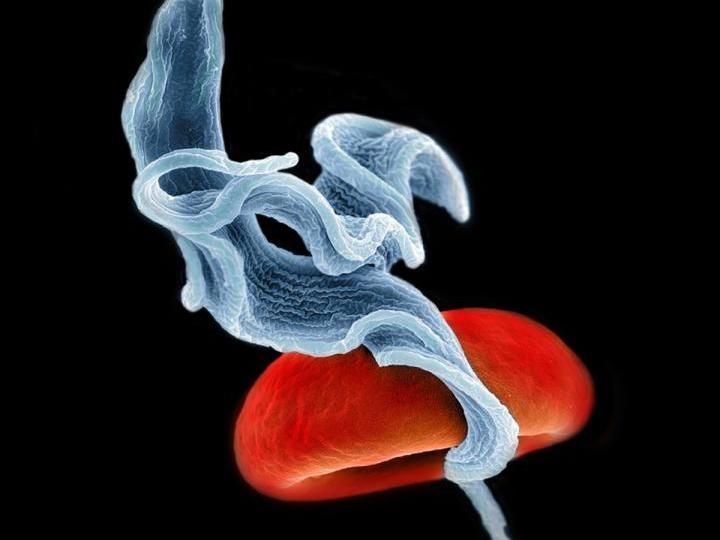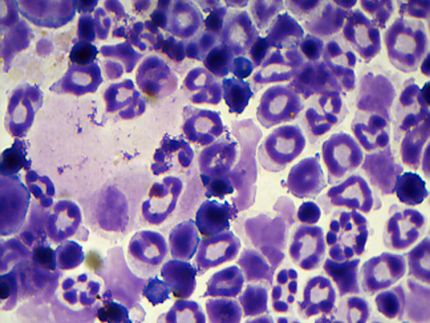Turbocharger for the cell machinery
The classic molecular-biological narrative has a simple form: Gene-RNA-protein. This is what we learned in school: DNA is transcribed into RNA. In the protein factories (the so-called ribosomes), the RNA serves as a kind of punch card - the proteins are assembled by the machinery exactly according to the DNA template. A single large apparatus can thus produce a wide variety of proteins. In recent decades, however, biologists have realised that this scheme is far too simple, in particular with regard to the role of RNA. More and more RNA has been found with no code, i.e. no protein instructions. Today, it is assumed that in many living organisms the majority of RNA produced by transcription is actually "non-coding". In humans, noncoding RNA makes up an amazing 98 percent of RNA. Why is so much RNA transcribed that does not serve the "classical" purpose? RNA is obviously not only a DNA blueprint, but also takes on many other tasks in the cell.

Scanning electron microscope image of two trypanosomes (blue) swimming in the blood. The round structure is a red blood cell.
Christopher Jackson, IKELOS
Brake, but also accelerator
But it is not only human biology that continues to pose puzzles. Researchers are particularly interested in trypanosomes, parasitic protozoa responsible for sleeping sickness. These microorganisms are known for their unique molecular biological apparatus. Recently, researchers from the Department of Chemistry and Biochemistry at the University of Bern discovered a particularly unusual mechanism: an ncRNA molecule that acts as a kind of stimulant for ribosomes and that is produced during stress. This finding astonished the researchers because until now only the opposite function of non-coding RNA had been known, acting as inhibitors for the cell apparatus. During stress, ncRNA molecules attach to ribosomes, pushing the emergency stop button of the protein machinery. When nutrients become scarce or environmental conditions become especially challenging, the entire assembly line is shut down, saving time for the cell. ncRNA molecules are predestined for such a regulatory mechanism - they are produced within fractions of minutes and can thus lead to a much faster reaction of the cell than via the detour of a protein.
Possible target
But an acceleration of production? This irritated the researchers in two respects: Firstly, it is not immediately clear what the purpose of such a regulation might be, and secondly, it is much more difficult to come up with an intuitive mechanism for such a mode of operation. "We knew of inhibitors, which typically block important binding sites," said Norbert Polacek, the head of the research group. To unravel the mystery, Polacek's group collaborated with trypanosome experts from André Schneider's group, both part of the Bern-based NCCR (National Centre of Competence in Research) "RNA and Desease". Together they were able to show that the stimulating effect of RNA has a precautionary effect: Stress situations are usually followed by more "relaxed" times, and being able to produce proteins again as quickly as possible can be crucial. The ncRNA fragment has the effect of bringing the ribosomes up to full production capacity without delay as soon as, for example, sufficient nutrients are available again - Polacek calls it a " kick start " for the cell.
The exact mechanism remains unclear, however, and Polacek believes this opens up an interesting field for further research. At best, the discovery will lead to a whole new class of substances for the treatment of trypanosomal diseases. For the biological extravagances of trypanosomes also make them vulnerable. Once we understand better how it works, we might find ways to disturb this turbocharger that are completely harmless to humans.
Original publication
Original publication
Roger Fricker, Rebecca Brogli, Hannes Luidalepp, Leander Wyss, Michel Fasnacht, Oliver Joss, Marek Zywicki, Mark Helm, André Schneider, Marina Cristodero & Norbert Polacek; "A tRNA half modulates translation as stress response in Trypanosoma brucei"; Nature Comm.; 2019
Topics
Organizations
Other news from the department science

Get the analytics and lab tech industry in your inbox
By submitting this form you agree that LUMITOS AG will send you the newsletter(s) selected above by email. Your data will not be passed on to third parties. Your data will be stored and processed in accordance with our data protection regulations. LUMITOS may contact you by email for the purpose of advertising or market and opinion surveys. You can revoke your consent at any time without giving reasons to LUMITOS AG, Ernst-Augustin-Str. 2, 12489 Berlin, Germany or by e-mail at revoke@lumitos.com with effect for the future. In addition, each email contains a link to unsubscribe from the corresponding newsletter.


























































